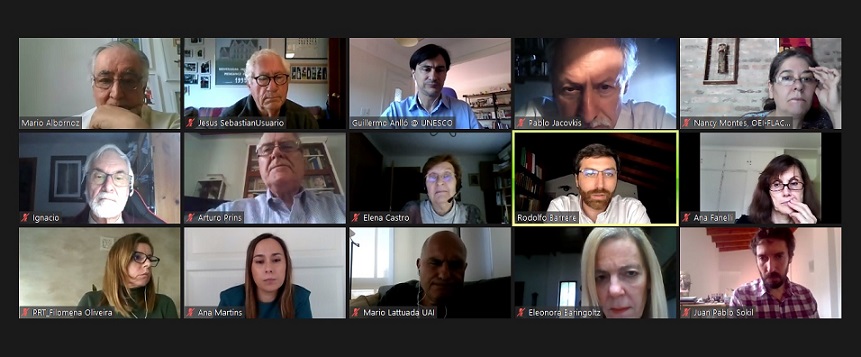
In a meeting that served to celebrate the 25 years of the Ibero-American Network of Science and Technology Indicators (RICYT) and project it into the future, on December 9 it was presented The State of Science 2020, publication that compiles the main indicators of the region, together with various analysis works on the available statistical information.
The meeting – organized by RICYT, the Ibero-American Observatory of Science, Technology and Society (OCTS) of the Organization of Ibero-American States (OEI) and the UNESCO Regional Office of Sciences for Latin America and the Caribbean – featured in its opening with the words of Mariano Jabonero, Secretary General of OEI; Lidia Brito, Director of the UNESCO Regional Office of Sciences for Latin America and the Caribbean; and Roberto Salvarezza, Minister of Science, Technology and Productive Innovation of the Argentine Republic.
When celebrating the anniversary of RICYT, Jabonero congratulated its members for having created “a very powerful system of indicators to understand the science of the region” and praised the work carried out within OCTS, which he defined as “an instrument rich and important, who has achieved identity in the region and a complicity with other relevant actors, such as our colleagues from the UNESCO office in Montevideo ”.
Jabonero also spoke on one of the OEI initiatives that seek to place research in a privileged place: the Universidad Iberoamérica 2030 strategy. “Our objective is to help strengthen national science and technology systems, the evaluation and execution of scientific policies , improving production from research and development. We must find a way for education and technology to guide Ibero-America to gain a space in the knowledge market. It is no longer enough for us to just be a region that exports raw materials. ”
“More than ever we know today that science saves lives,” Brito declared next. “Not only from a health perspective, but also from sustainable development. We must take advantage of it to make a difference at the local level and improve the personal and collective life of Ibero-American citizens. ” Regarding RICYT, the UNESCO official thanked it for putting on the table “the statistics we need to carry out conscious decision-making. Having quality data allows us to have a regional perspective that helps us better cooperate between countries and institutions. Only with scientific evidence can Ibero-America grow, and for this we must jointly promote it towards open science ”.
Finally, Salvarezza indicated that the region needs more and better human resources, which forces its countries to redouble efforts in the training of qualified professionals and the consequent improvements in terms of infrastructure and equipment. “We want a scientific community that is properly funded and valued, that is recognized by society and in turn is committed to it to respond to the problems that afflict it,” said the minister. “In this search, the work carried out by RICYT is a fundamental input to know where the Ibero-American countries are located at the international level and, based on that knowledge, generate public policies that reflect on the comparison of the societies of the region and the region itself with respect to others. ”
The full video of the presentation is available here.